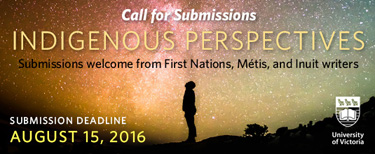When one (contest) door closes, another opens: this year's CNF Contest is wide open and accepting entries for consideration of the $1000 prize! Deadline is August 1.
Send us your best personal essay, memoir, biography, travel piece, social commentary, or historical account... if it's real and creative—and between 2000 to 3000 words—we want to read it!
All entrants receive a complimentary one-year subscription to the Malahat. Entries cost between $35 and $45 depending on where you live. All additional entries cost $15, no limit.
This year's contest judge is Lee Maracle. Read her bio note here (interview coming in next month's Malahat lite).
Submit your work today to be considered for the $1000 prize!
Read about last year's CNF Contest winner, Maria Tessa Liem.

The Malahat Review invites writers who identify as First Nations, Métis and Inuit to submit their unpublished work to an upcoming issue on contemporary Indigenous writing in Canada.
To be published in January 2017, Indigenous Perspectives will celebrate the aesthetics, concerns, contributions, and achievements of Indigenous authors living in or from “Canada,” recognizing their crucial role in providing a truly complete picture of what it is like to be alive in North America in the past, future, and especially today.
The issue is being guest-edited by Philip Kevin Paul (poetry), Richard Van Camp (fiction), and Leanne Betasamosake Simpson (creative nonfiction).
Submit your poetry, fiction, and/or CNF to this issue today. Deadline to submit is August 15.
Indigenous Perspectives Issue Interview: Richard Van Camp, Fiction Editor
 Troy Sebastian, a writer from the Ktunaxa community of ?aq̓am, recently spoke with Richard Van Camp about his role as fiction editor for the Malahat's upcoming Indigenous Perspectives issue. Alongside Leanne Betasamosake Simpson (creative nonfiction editor) and Philip Kevin Paul (poetry editor), Van Camp will read all fiction submissions for consideration.
Troy Sebastian, a writer from the Ktunaxa community of ?aq̓am, recently spoke with Richard Van Camp about his role as fiction editor for the Malahat's upcoming Indigenous Perspectives issue. Alongside Leanne Betasamosake Simpson (creative nonfiction editor) and Philip Kevin Paul (poetry editor), Van Camp will read all fiction submissions for consideration.
TS: Poetry, fiction and creative nonfiction are categories easily familiar within the Canadian literary community. Do these categories fit within Indigenous storytelling canon and tradition?
RVC: Yes, I believe we speak pure poetry when we're sharing stories that are based on things that have happened or are still happening. I know I spruce up stories I retell. I think everyone does. I hope they do, anyway!
TS: The Truth and Reconciliation Commission continues to shape and frame discussions both within Indigenous communities as well as within Canada. Does the Commission's work influence your writing?
RVC: Yes, I'm working on a novella right now about what the TRC means to me through the eyes of a young man with a lot of questions. Stay tuned on that one. It's with McKellar & Martin and it's due out next year.
Read the rest of this interview on the Malahat website.